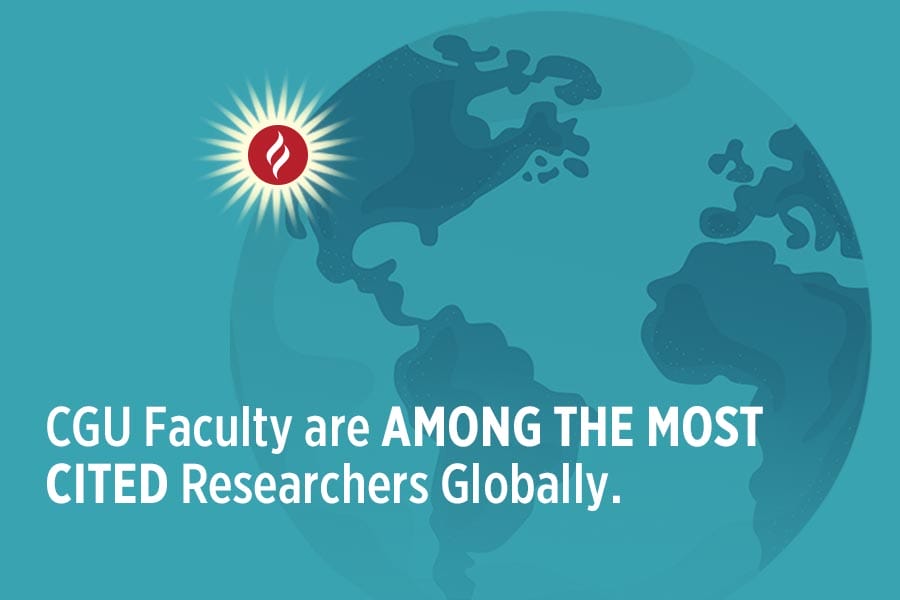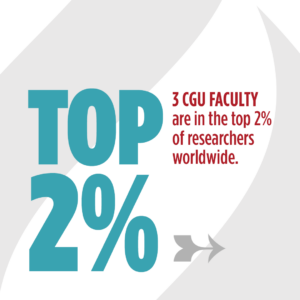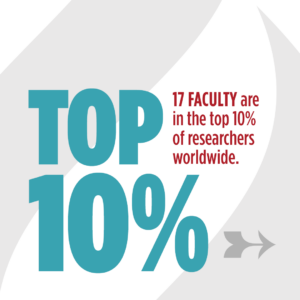CGU Faculty Among Most Cited Researchers Globally

The annual AD Scientific Index provides a who’s who of researchers whose work is cited most frequently by other academics around the world. The index analyzes academic studies from 218 countries, 21,439 universities/institutions, and 1,345,189 scientists, using numerous criteria. Once again, CGU faculty are among the cream of the crop.
Three active faculty members are in the top 2 percent of most-cited researchers, with 17 in the top 10 percent. In all, 24 out of 132 full-time, active CGU faculty are in the top 20 percent of researchers worldwide. Over the next several months, we will tell the story of CGU’s most-cited faculty.


Active Faculty in the Top 10 Percent of Researchers
Michael Hogg is a social psychologist and the founder and director of the Social Identity Lab at CGU. He has published extensively on intergroup relations, group processes, influence and leadership, and self and identity, with over 400 scientific publications cited more than 110,000 times. His current research focuses on identity-related influence and leadership processes, the role of social identity in radicalization, and intergroup conflict.
C. Anderson Johnson is a professor and founding dean of CGU’s School of Community & Global Health. His research interests include the prevention of tobacco, alcohol, drug abuse, HIV-AIDS, and obesity, community and mass media approaches to promoting healthy lifestyles, and social and environmental influences on health-related behavior and outcomes. Johnson has over 25 years of experience in scientific and administrative leadership of large-scale community-based research projects. His current work focuses on gene-environment and culture-environment interactions affecting tobacco and alcohol use trajectories and prevention.
Alan W. Stacy’s research interests include implicit cognition in health behavior and addiction, multiple memory systems in the brain, and health interventions using electronic modalities. His recent NIH-funded studies focus on reducing infection risk in drug users and investigating the causes of increased electronic tobacco and opioid use among at-risk youth.
William Crano’s research interests include social influence, the impact of minorities on the beliefs and actions of the majority, and the effects of self-interest on attitudes and actions. He also conducts applied research on preventing the spread of HIV/AIDS and drug abuse in children and adolescents. Crano has held many appointments in academia and served as an advisor to the UN Office on Drugs and Crime and the US State Department. His research is funded by the National Institute on Drug Abuse and the National Institute of Child Health and Human Development.
Stewart I. Donaldson’s research interests include evaluation theory and practice, positive psychology, positive organizational psychology, human resource development, community/global health program design, and positive youth development and education. He has received numerous awards for his contributions to the field of evaluation, and he actively recruits students to join his labs, including the Accenture Talent Innovation Lab, Positive Organizational Psychology Research Lab, and Leader & Organization Vitality Lab. Donaldson is also the executive director of the Claremont Evaluation Center and The Evaluators’ Institute.
Kathy Pezdek’s research focuses on applied cognitive psychology with a particular interest in eyewitness memory, suggestibility of memory, lineup techniques, and autobiographical memory. She is an elected Fellow of the Association for Psychological Science (APS) and the Psychonomic Society and has served on the editorial boards of several journals. Pezdek regularly publishes with her graduate students and frequently serves as an expert witness on eyewitness memory and identification in court cases.
Kim D. Reynolds’ research interests include nutrition, physical activity, and health communications. He has extensive experience in developing, implementing, and evaluating school- and community-based interventions. Reynolds is currently leading studies on obesity prevention, built and social determinants of physical activity, and behavioral intervention for type 2 diabetes management and prevention in married couples and middle school children. His research is funded by the National Institute of Diabetes and Digestive and Kidney Diseases (NIDDK).
Paul J. Zak specializes in neuroeconomics, neuromanagement, and neuromarketing. He has written three books on the topic, including his latest, Immersion: The Science of the Extraordinary and Source of Happiness, which identifies the neurologic basis for extraordinary experiences. Zak has given TED Talks and co-founded the first neuroscience-as-a-service company, Immersion Neuroscience.
Yi Feng is the Luther Lee Jr. Memorial Chair Professor at CGU. He has served as provost, dean, and founding chair of various departments at the university. His areas of concentration are international political economy, public policy analysis, and quantitative methodology. Feng has published extensively on topics such as economic growth, investment, human capital, international trade, and political regime transitions. His current research interests include global power shifts, globalization, and regional political, economic, and business development, as well as continuing his research on China and major emerging powers.
Bin Xie’s research interests include obesity prevention, disparities in health, and risk behaviors in American minority populations. He has an interdisciplinary background in epidemiology, biostatistics, nutritional sciences, and behavioral sciences, and has expertise in advanced statistical approaches such as structural equation models, growth curve and mixture models, and generalized estimating equations. Xie has served as principal investigator on several NIH-funded projects and has provided statistical and methodological support on over 15 projects funded by NIH, state, and university studies.
Hrushikesh Mhaskar has done pioneering work in the theory of weighted polynomial approximation and harmonic analysis, particularly in the study of orthogonal polynomials. He has also made significant contributions to the theory of machine learning and signal processing. Mhaskar has published extensively and holds editorial positions in several mathematics journals. His research has been supported by multiple organizations, including the National Science Foundation. Mhaskar has received numerous honors and awards, including the Alexander v. Humboldt fellowship and the John von Neumann distinguished professorship at Technical University in Munich in 2011.
Paula Palmer‘s research focuses on the social and cultural determinants of health, community-based participatory research, technology applications for health behavior interventions, and graduate and professional training. She has published numerous peer-reviewed publications and book chapters, and her current research focuses on reducing cancer health disparities among ethnically diverse and underrepresented populations, including a smoking cessation program for young adult Native Hawaiian Pacific Islanders and a study on educating Pacific Islander populations about biospecimen collection, biobanking, and genetic research.
Michelle C. Bligh is the executive vice president, provost, and professor of organizational behavior in the Division of Behavioral & Organizational Sciences. Her research interests focus on charismatic leadership, gender, interpersonal influence, and followership. She has authored over 75 refereed publications, and she was recognized by The Leadership Quarterly as one of the top 50 most-cited authors of the last decade. She serves on several editorial review boards and teaches leadership and change management around the globe, including Europe, Asia, North America, and Latin America.
Graham Bird is a clinical professor of economic sciences, program director of International Money and Finance; International Economic and Development Policy, and co-director of the Claremont Institute for Economic Policy Studies. He has served as a consultant or advisor to several organizations, including the IMF, World Bank, and U.N. agencies. His most recent book, The IMF: Distinguishing Reality from Rhetoric, co-authored with Dane Rowlands, examines the impact of IMF programs on economic growth, private capital flows, and foreign aid. He is the author, co-author, or editor of more than 250 publications, including more than two dozen books and monographs.
Bernie Jaworski is the Drucker Chair in Management and the Liberal Arts at the Drucker School. His research interests include organic growth, marketing, and leadership. Jaworski has taught at several universities and served as a senior partner at the Monitor Group, a global management consulting firm, where he co-founded two global practice areas. He has also co-authored textbooks on e-commerce and taught topics including leadership, corporate strategy, and service management.
Deborah Freund’s research interests are in Medicaid managed care, health disparities, the impact of the Medicaid expansion under the Affordable Care Act, how Covid-19 has impacted access to care and insurance coverage, and vaccine hesitancy. Freund has authored more than 100 refereed articles and chapters, two books, and has been on the editorial board of 10 journals and publishers. Freund’s previous positions include president of CGU, and provost and vice chancellor for academic affairs at Syracuse University. She is currently on the board of Cedars Sinai Health System, Children’s Hospital Los Angeles, the San Antonio Regional Hospital, and the UC Riverside School of Medicine.
Jason T. Siegel’s research focuses on the social psychology of health behavior change. Siegel applies theories of persuasion and motivation to create messages for increasing help-seeking among people with depression, reducing the stigmatization of people with depression, increasing organ donor registration behavior, and reducing substance abuse in adolescents. He has secured over $5 million in grants and contracts and has received the Western Psychological Association’s Social Responsibility Award and CGU’s Presidential Research Award.
Emeriti In the Top 10 Percent of Researchers
Dale Berger’s research interests include research methodology, educational technology, and social and legal control of alcohol-impaired driving. Berger offered a range of advanced statistics courses and Psychology of Thinking, as well as statistics and research methodology workshops for The Evaluators’ Institute and Claremont Professional Development Workshops. He consults on applied research methods and data analysis, and he has directed research grants from the National Science Foundation and the National Institute of Justice.
Lorne Olfman is a professor emeritus with research interests in how software is learned and used in organizations, the impact of computer-based systems on knowledge management, and the design and adoption of systems used for group work. He has co-directed the Social Learning Software Lab and has co-authored 168 refereed articles. He is a senior editor of the AIS Transactions on Human Computer Interaction.
Thomas Willett’s research interests include international and monetary economics, behavioral finance, political economy, and analysis of national and international economic policies. His recent research has focused on the causes and effects of international capital flow surges and reversals, currency and financial crises, and the roles of mental models and behavioral biases. He has authored or edited over 20 books and published over 200 articles. He has also served as a senior economist on the President’s Council of Economic Advisers and as director of international research at the US Treasury.
This list would not be complete without Mihaly Csikszentmihalyi, who remains in the top 2% of researchers cited around the world, even after his passing in 2021. He was a co-founder of the Quality of Life Research Center and of positive psychology, most known for his research on flow, or the state of optimal performance. He was dedicated to finding out what constitutes a happy life and authored over 100 publications, including the best-selling book Flow: The Psychology of Optimal Experience.